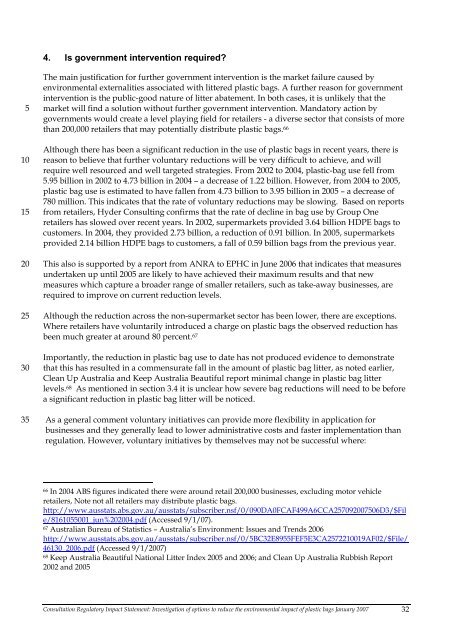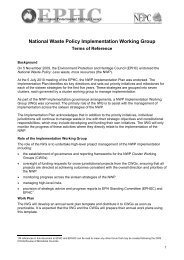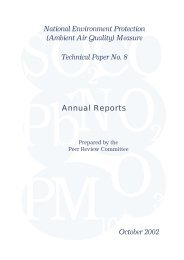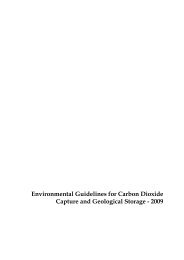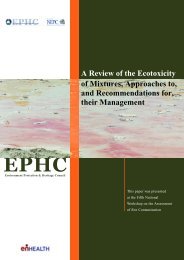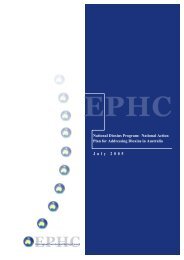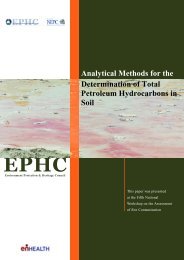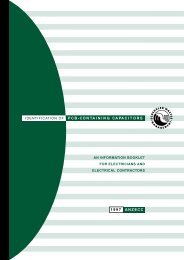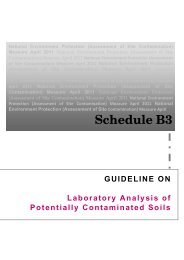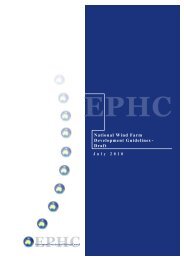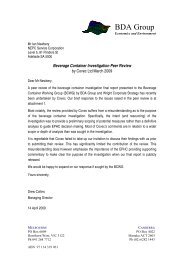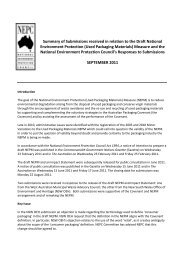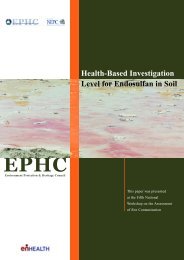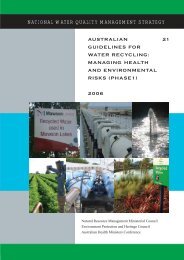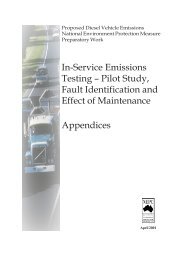Plastic Bags - COAG Standing Council on Environment and Water
Plastic Bags - COAG Standing Council on Environment and Water
Plastic Bags - COAG Standing Council on Environment and Water
You also want an ePaper? Increase the reach of your titles
YUMPU automatically turns print PDFs into web optimized ePapers that Google loves.
4. Is government interventi<strong>on</strong> required?<br />
5<br />
10<br />
15<br />
20<br />
25<br />
30<br />
35<br />
The main justificati<strong>on</strong> for further government interventi<strong>on</strong> is the market failure caused by<br />
envir<strong>on</strong>mental externalities associated with littered plastic bags. A further reas<strong>on</strong> for government<br />
interventi<strong>on</strong> is the public-good nature of litter abatement. In both cases, it is unlikely that the<br />
market will find a soluti<strong>on</strong> without further government interventi<strong>on</strong>. M<strong>and</strong>atory acti<strong>on</strong> by<br />
governments would create a level playing field for retailers - a diverse sector that c<strong>on</strong>sists of more<br />
than 200,000 retailers that may potentially distribute plastic bags. 66<br />
Although there has been a significant reducti<strong>on</strong> in the use of plastic bags in recent years, there is<br />
reas<strong>on</strong> to believe that further voluntary reducti<strong>on</strong>s will be very difficult to achieve, <strong>and</strong> will<br />
require well resourced <strong>and</strong> well targeted strategies. From 2002 to 2004, plastic-bag use fell from<br />
5.95 billi<strong>on</strong> in 2002 to 4.73 billi<strong>on</strong> in 2004 – a decrease of 1.22 billi<strong>on</strong>. However, from 2004 to 2005,<br />
plastic bag use is estimated to have fallen from 4.73 billi<strong>on</strong> to 3.95 billi<strong>on</strong> in 2005 – a decrease of<br />
780 milli<strong>on</strong>. This indicates that the rate of voluntary reducti<strong>on</strong>s may be slowing. Based <strong>on</strong> reports<br />
from retailers, Hyder C<strong>on</strong>sulting c<strong>on</strong>firms that the rate of decline in bag use by Group One<br />
retailers has slowed over recent years. In 2002, supermarkets provided 3.64 billi<strong>on</strong> HDPE bags to<br />
customers. In 2004, they provided 2.73 billi<strong>on</strong>, a reducti<strong>on</strong> of 0.91 billi<strong>on</strong>. In 2005, supermarkets<br />
provided 2.14 billi<strong>on</strong> HDPE bags to customers, a fall of 0.59 billi<strong>on</strong> bags from the previous year.<br />
This also is supported by a report from ANRA to EPHC in June 2006 that indicates that measures<br />
undertaken up until 2005 are likely to have achieved their maximum results <strong>and</strong> that new<br />
measures which capture a broader range of smaller retailers, such as take-away businesses, are<br />
required to improve <strong>on</strong> current reducti<strong>on</strong> levels.<br />
Although the reducti<strong>on</strong> across the n<strong>on</strong>-supermarket sector has been lower, there are excepti<strong>on</strong>s.<br />
Where retailers have voluntarily introduced a charge <strong>on</strong> plastic bags the observed reducti<strong>on</strong> has<br />
been much greater at around 80 percent. 67<br />
Importantly, the reducti<strong>on</strong> in plastic bag use to date has not produced evidence to dem<strong>on</strong>strate<br />
that this has resulted in a commensurate fall in the amount of plastic bag litter, as noted earlier,<br />
Clean Up Australia <strong>and</strong> Keep Australia Beautiful report minimal change in plastic bag litter<br />
levels. 68 As menti<strong>on</strong>ed in secti<strong>on</strong> 3.4 it is unclear how severe bag reducti<strong>on</strong>s will need to be before<br />
a significant reducti<strong>on</strong> in plastic bag litter will be noticed.<br />
As a general comment voluntary initiatives can provide more flexibility in applicati<strong>on</strong> for<br />
businesses <strong>and</strong> they generally lead to lower administrative costs <strong>and</strong> faster implementati<strong>on</strong> than<br />
regulati<strong>on</strong>. However, voluntary initiatives by themselves may not be successful where:<br />
66 In 2004 ABS figures indicated there were around retail 200,000 businesses, excluding motor vehicle<br />
retailers, Note not all retailers may distribute plastic bags.<br />
http://www.ausstats.abs.gov.au/ausstats/subscriber.nsf/0/090DA0FCAF499A6CCA257092007506D3/$Fil<br />
e/8161055001_jun%202004.pdf (Accessed 9/1/07).<br />
67 Australian Bureau of Statistics – Australia’s Envir<strong>on</strong>ment: Issues <strong>and</strong> Trends 2006<br />
http://www.ausstats.abs.gov.au/ausstats/subscriber.nsf/0/5BC32E8955FEF5E3CA2572210019AF02/$File/<br />
46130_2006.pdf (Accessed 9/1/2007)<br />
68 Keep Australia Beautiful Nati<strong>on</strong>al Litter Index 2005 <strong>and</strong> 2006; <strong>and</strong> Clean Up Australia Rubbish Report<br />
2002 <strong>and</strong> 2005<br />
C<strong>on</strong>sultati<strong>on</strong> Regulatory Impact Statement: Investigati<strong>on</strong> of opti<strong>on</strong>s to reduce the envir<strong>on</strong>mental impact of plastic bags January 2007 32


